| Our Vision | Our Role and Services | |||
| Human Resources | Support and Participation | |||
| Significant Aspects |

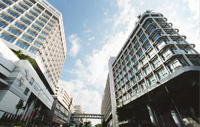 |
| The HA Headquarters |
The Hong Kong Housing Authority (HA) is a statutory body established in April 1973 under the Housing Ordinance (Chapter 283). The HA develops and implements a public housing programme which seeks to achieve the Government's housing policy objective of providing subsidised public housing to low-income families who cannot afford private rental accommodation in the territory.
Our Vision:
|
Our Mission:
|
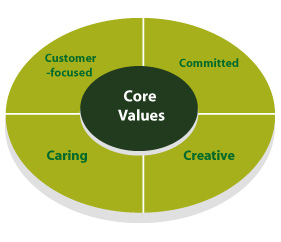
As we are taking care of over 670 thousand public rental housing flats within the territory, we always put sustainability in our top priority. We believe that sustainability is an essential element to maintain harmony in our living environment. We therefore have made every effort to balance the economic, social and environmental needs and concerns of our stakeholders and have incorporated sustainable considerations such as environmentally friendly, user friendly, functional, safety and cost-effectiveness in our housing development and management programme.
We realise our vision and mission through our Strategy for Sustainable Construction, which reflects our view on sustainable development and provides a framework for identifying our sustainability priorities.
Our Strategy for Sustainable Construction:
|
Since the last decade, we have advocated "more conservation and less demolition" principle in managing the public housing. We have proactively inspected and maintained the public housing so as to reduce the needs for demolition and re-development of our older housing estates. This has not only reduced burdens in our environment, but also achieved in cost-effectiveness and benefit in community cohesion. In addition, we have improved the construction quality so that the future needs and costs for maintenance will be minimised and our residents will enjoy a pleasant and more sustainable living environment. Our sustainability priorities are:
Environmental
The HA is committed to properly managing and reducing consumption of resources in our daily operations, especially in relation to waste reduction and energy use. We are also committed to introducing environmentally friendly methods to further reduce overall environmental impacts arising from our planning, development, management and maintenance processes.
Social
The HA is committed to prioritising the public housing to those who need it most. We are also committed to providing a safe, hygienic and affordable living environment to our tenants making our public housing estates a better and comfortable place to live. In addition, we seek to become a role model in providing a safe and healthy working environment for our business partners who are involved in our housing development and management services. We endeavour to enhance social cohesion and contribute to the well-being of society as a whole.
Economic
The HA is committed to adopting cost-effectiveness and economically-viable approaches in all aspects of our public housing programme. These can be achieved through a
number of measures, including optimisation of the HA's resources, prevention of the abuses of public housing and extension of the useful life of our existing buildings.
HA’s operations in relation to each of the sustainability components are depicted in the following figure.
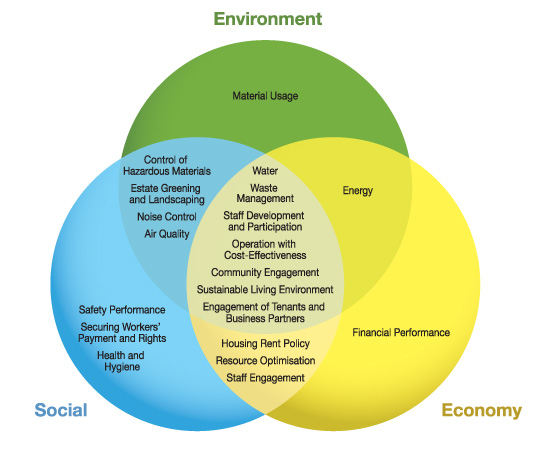
![]()
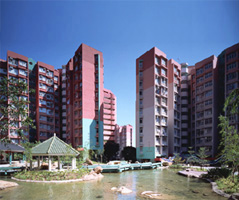 |
| HA's Public Rental Housing: Ma Heng Estate |
The Housing Authority (HA) formulates housing development strategies and oversees strategic planning and implementation of the public housing programme in Hong Kong. We plan, build, manage and maintain different types of public housing, including rental housing estates, interim housing estates, and transit centres. In addition, we own and operate some flatted factories and ancillary commercial and other non-domestic facilities.
Housing Stock and Production
In 2007/08, we built about 13 700 new rental flats in six estates located in the Kwai Tsing, Yuen Long, North, Eastern, Kwun Tong and Sham Shui Po districts. About 60% of these flats are in the urban and extended urban areas, with the remainder in the New Territories. The total number of Public Rental Housing (PRH) flats at the end of March 2008 increased to
673 800 in 190 estates. The forecasted production for PRH in through 2012/13 is about
77 000 flats, or an average of about 15 000 flats per year.
As of March 2008, there are about 36 projects under construction, with six piling contracts and seven building contracts awarded at the end of that month.
Commercial Properties
We own and manage some 168 130 square metres of commercial and retail facilities and
26 400 car parking spaces within our PRH estates.
Infrastructure
While planning and developing PRH estates, we also consider the necessity to develop associated infrastructure facilities such as footbridges, gardens and public transport terminals to provide a convenience and sustainable living environment to our tenants.
![]()
Staff Resources
At the end of March 2008, we had a total of 8 780 staff, including civil servants and HA staff, representing an increase of 0.7% over the previous year. In 2007/08, we had about 1 200 HA staff.
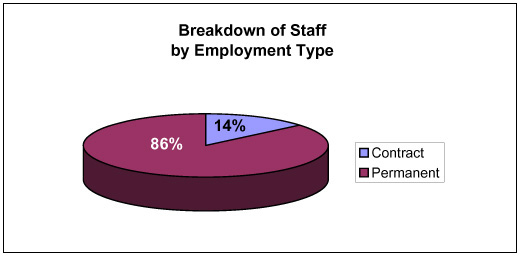
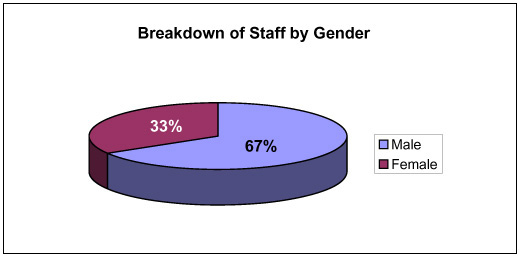
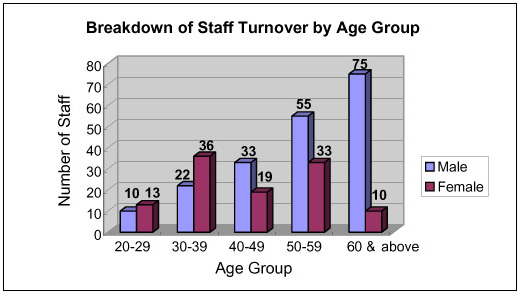
Article 99 of the Basic Law stipulates that new recruits appointed to the Civil Service on or after 1 July 1997 must be permanent local residents and all HA's senior staff are permanent Hong Kong residents.
Our success lies in our care for people. We therefore maintain good relationship and close communication between staff and provide suitable welfare to ensure their well-being. Effective communications are maintained through the publication of our bi-weekly "Housing Dimensions" as well as discussion and consultation with different staff associations/working groups and Departmental Consultative Committees. We had also delivered talks on staff counseling and organised different training to maintain corporate wellness. We have been providing counselling service to help staff cope with stress arising from work pressure and other personal problem since 1999 and during the year we received and handled 59 call cases. Effective April 2008, we will work with the Hong Kong Young Women's Christian Associations to provide staff counselling service.
Staff Pay Structure and Benefits
Remuneration of our staff follows either the civil service pay scales or HA pay bands depending on the type of employment. HA staff are catergorised into different job grades of specific pay bands. To maintain competitiveness, their remuneration packages are benchmarked at a level broadly comparable to the market. The pay bands and base salaries of HA staff are adjusted annually based on pay trend movement of the market. Subject to individual's performance which is assessed through a fair and comprehensive review of a 3-level staff appraisal system, an officer on civil service pay scales may receive one increment annually in his respective rank scale while HA staff may be granted a one-off merit payment annually.
Staff may also enjoy various fringe benefits depending on their rank levels and employment types. These benefits include medical and dental treatment, housing benefits, annual leave and retirement benefits as appropriate.
Staff Integrity
Managing all public housing resources in the territory, it is important to maintain high standards of integrity and conduct within the HA. In addition to the guidelines provided by Civil Service Bureau, we have developed our departmental staff circulars which stipulate the guidelines and requirements for staff to declare private investments, avoid conflict of interest and deal with situation when being offered advantages and entertainment.
The HA has also developed internal circulars to deal with attempted bribe, allegations of corruption, Independent Commission Against Corruption's (ICAC) referrals and operational liaison with ICAC.
Anti-corruption's briefings are provided to all newly appointed staff as part of the induction programme. In 2007/08, over 1 600 staff attended various courses related to anti-corruption including 24 sessions of integrity reinforcement seminar. We are fully committed to co-operating with ICAC in combating corruption.
Human Rights
People are the most important assets in the HA. We endeavour to ensure equal opportunities and fair treatments in terms of remuneration, fringe benefits, promotion and compensation among our staff without discriminating individual's gender, ethnicity, age and movement ability. We fully comply with all the employment related legislation and prohibit child labour and forced labour.
Our staff also have freedom to join staff association/working groups in their respective grades or ranks. We have a total of 33 numbers of staff association/working groups and 5 Departmental Consultative Committees. These facilitate our communication with staff on issues of mutual concern.
![]()
As a public housing agency for the Government, we have maintained close working relationships with other government departments during our daily operations. These involve the provision of professional advises and the internal governance process to realize our public housing programme. Despite our own efforts, we always support community voluntary initiatives to demonstrate our commitment to sustainable development. During the year, we had signed the Clean Air Charter and the Hong Kong Green Purchasing Charter to help combat local air pollution problem and foster the usage of environmentally friendly products.
![]()
The HA is geared towards sustainable housing in its daily operations. We make every effort to fulfill Hong Kong's public housing needs without compromising housing and environmental quality.
We understand that our operations in estate management and building construction will have significant environmental, health, safety and community impact. We therefore have taken a precautionary approach to manage potential risk through the implementation of a comprehensive management system following the "plan-do-check-act" principle, to properly control and mitigate significant impacts arising from our daily operations. In addition, our senior management will actively review public and stakeholder concerns through Senior Offical Meeting and different customer satisfaction surveys. Throughout the years we have practiced sustainable initiatives in the life cycle of our operations to make our works environmentally friendly, people-oriented and cost-effective.
Major potential significant aspects related to our operations include:
| Office | Construction | Management and Maintenance |
Demolition | |
| Significant Environmental Aspects | ||||
| Site Identification and Land Use | ||||
| Air Emissions | ||||
| Noise Emissions | ||||
| Energy Efficiency | ||||
| Water Conservation and Discharge | ||||
| Materials Selection and Usage | ||||
| Hazardous Materials | ||||
| Waste Management | ||||
| Estate Greening | ||||
| Significant Health and Safety Aspects | ||||
| Indoor Air Quality | ||||
| Environmental Hygiene | ||||
| Building Accessibility | ||||
| Occupational Hazards and Risks | ||||
| Ergonomics | ||||
| Other Health and Safety Concerns | ||||
| Significant Social Aspects | ||||
| Employee Development | ||||
| Supply Chain Management | ||||
| Significant Economical Aspects | ||||
| Cost-effectiveness | ||||
| Housing Resources Management | ||||